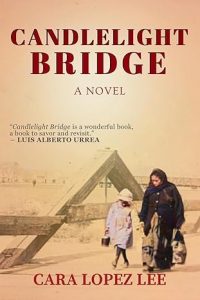OLD MR. MA
By Cara Lopez Lee
 I love displaying old family photos where I can see them every day. It’s the expression of a deep urge for connection and belonging. But my grandma gave me one photo I keep hidden in my file cabinet.
I love displaying old family photos where I can see them every day. It’s the expression of a deep urge for connection and belonging. But my grandma gave me one photo I keep hidden in my file cabinet.
It’s an old black-and-white of a stern-faced Chinese man with a little bowtie and big blocky head—like Grandma’s and mine. He’s her father, Ma Bing Sam, long-ago owner of a restaurant in El Paso, Texas. Grandma was a child of both Chinese and Mexican immigrants, and I always begged her for family stories.
No doubt she gave me her father’s photo, so I’d always remember who to blame.
Back in the early 1900s, Ma Bing Sam took a Mexican bride less than half his age. Then he had sex with her little sister, when he was thirty-six and she was fourteen. His wife’s sister was Grace Lopez, the girl who gave birth to the family secret: Carolina, my grandma.
Ma Bing Sam convinced his in-laws not to tell anyone he was the father. If his name were ruined “who would support the family?” One of his other daughters stopped speaking to me when I dared call what her father did “rape.” I get it. To her, he was a sweet old man who protected her and taught her to cook. He was also a pillar of El Paso’s Chinatown, who helped fellow immigrants get papers, find jobs, even pay doctor bills.
But to the Lopez family, he was the man who ruined my great grandma. They said happy, chirpy Grace became a silent, withdrawn shell, till she died of tuberculosis at seventeen. My only photo of Grace sits atop a shelf in my office. In it, she’s wearing a 1920’s cloche hat covered in flowers, but her eyes look haunted.
I look into those eyes and wonder; Did Grace really die of a broken heart?
I’ve wrestled with the idea that I contain within me the genetic history of both my great-grandma and great-grandpa, both victim and perpetrator. That single act of abuse has reverberated through generations.
Grace’s daughter, my grandma, grew up an orphan among her mother’s sisters. The Lopez Aunts made her work like Cinderella: cooking, cleaning, taking care of their kids. When Grandma gave birth to my dad, out of wedlock, one aunt suggested she ask her father for help.
“Father? What father?!” Grandma was stunned. It was the first time anyone told her that her Uncle Ma Bing Sam was also her dad.
She wrote him an angry letter. His response? He hired her to work at his El Paso restaurant, the Chung King Café, waiting tables for tips.
She became a bitter woman, who never learned to show affection to her son, who became my icy father. My dad has married seven times. Nobody knew what to do with me, including my mother. So, I was raised by Grandma—the bitter one.
She once said, “Cara, when you lose your mother, you lose everything.” Sometimes it seemed that way. Whenever I hugged Grandma, her arms never rested comfortably anywhere—as if even her arms never knew where they belonged. Once when I was four, I ran home crying because a bully beat me up. She said, “I won’t always be here to help you. You must learn to work things out yourself.”
I was always running home and never getting there.
Then, in 2008, at 45, I started writing a historical novel, to explore my burning question: how do you find home if you feel like you don’t belong? I searched for my great-grandpa’s past. One of his sons, my favorite uncle, said his father was born in Gong Hao, China.
I traveled to Gong Hao, only to discover it’s not a single village but a district of eleven villages. No idea which one was his. Locals took me to a ninety-nine-year-old man from one of several Ma-family villages, hoping he might know something.
Quick sketch of Git Ngon village: rice paddy, rice paddy, rice paddy, a couple of dozen gray-brick cottages, and the ruins of several Western-style mansions built decades ago by Overseas Chinese to show off their American wealth.
My translator and I were whisked to a cottage, into a courtyard packed with chattering women and their patriarch, Old Mr. Ma. He rose from his wheelchair to greet us, though he shook with the effort. He was so slight I could make out his skull, but he had bird-bright eyes and intense energy for a man of ninety-nine.
The women hustled me into a chair and thrust tea and dumplings at me as if to say, “Make yourself at home or else!”
Mr. Ma was excited to meet an American with ties to Ma people, but communication was tough. He spoke a local dialect. I asked questions in English, my translator asked his granddaughter in Cantonese, she asked her grandpa in Toisanese. Then everything came back the other way.
It took ten minutes to explain: “My great-grandfather was Ma Bing Sam, born in 1887. He left Gong Hao before you were born, so I don’t expect you to know much. Just hoping for some local history.”
But Mr. Ma refused to give up until he found a connection between us. So, I showed him my great-grandpa’s photo and an old letter from his son, my favorite uncle.
Mr. Ma’s face lit up. “Hou Hou Hou! Ma Bing Sam!”
A flurry of Chinese flew overhead.
My translator gasped, “Your great grandpa is from this village!”
Mr. Ma pulled out a red book filled with the names of Git Ngon’s male lineage going back centuries and showed me the page listing Ma Bing Sam and his eldest three sons.
What’s more: Mr. Ma did meet my great grandpa when he returned to visit in the 1930s. One of those crumbling Western mansions was built by my family. The clincher came when he said, “Ma Bing Sam had a Mexican wife…from Paso?”
My eyes filled with tears. For a stranger I never knew. Who Grandma always hated? Why? I can only say, something tugged at my bellybutton. The past.
Mr. Ma invited me to sign the red book.
“But I’m a woman.”
“It would be our honor. You are family.”
I felt Ma Bing Sam with us, claiming my family as his—no longer dismissed as the bastard-branch of the family tree.
With my signature, I accepted him too, declaring in writing: “I belong.”
That’s how I became the only woman in Git Ngon’s book of male ancestors.
Back in America, I shared this story with Grandma. In return, she gave me a rare gift: she smiled. In that moment, I came home.
Grandma passed away ten years ago, but I still see her all the time. Her portrait hangs in my office: Carolina Lopez in the 1940’s, a twenty-something knockout, with long rolled-and-pinned hair, piercing eyes, and a reluctant smile. That portrait stood watch for the fifteen years I wrote Candlelight Bridge, the first novel inspired by her stories.
In gratitude to Carolina, my surrogate mom, who showed me love by trusting me with her secrets, I honor that gift…by still keeping her father’s picture in a drawer.
—
CANDLELIGHT BRIDGE
 In 1910, twelve-year-old Candelaria Rivera and her family flee across the Chihuahuan desert to America so her father and brother can escape getting drafted into Mexico’s Federales, and so her whole family can escape the rising storm of the Mexican Revolution. Meanwhile, twenty-year-old Yan Chi Wong flees the Chinese Revolution and a devastating loss, also bound for America, where he’s nicknamed Yankee.
In 1910, twelve-year-old Candelaria Rivera and her family flee across the Chihuahuan desert to America so her father and brother can escape getting drafted into Mexico’s Federales, and so her whole family can escape the rising storm of the Mexican Revolution. Meanwhile, twenty-year-old Yan Chi Wong flees the Chinese Revolution and a devastating loss, also bound for America, where he’s nicknamed Yankee.
Down the road, this unlikely pair meet in the border town of El Paso, where they discover each has something the other needs to help them meet the challenges of life on the edge of America. Together they build a life, help Chinese immigrants cross the U.S.-Mexico border, and start a business. But soon a terrible desire threatens to destroy their lives.
Candlelight Bridge is not a romance, but a tale of refugees seeking home in a world that doesn’t want them, of a young woman saving her family in a world ruled by men, of grudging partners struggling to survive the American Dream.
“Cara Lopez Lee is a talented and audacious author. And CANDLELIGHT BRIDGE is a wonderful book, a book to savor and revisit.”
—Luis Alberto Urrea, author of GOOD NIGHT, IRENE and THE HUMMINGBIRD’S DAUGHTER
“Sweeping yet intimate, CANDLELIGHT BRIDGE traces the epic journey of Candelaria and Yankee across China, Mexico and the borderlands of America. With these defiant and determined characters, Cara Lopez Lee powerfully portrays the costs of survival. Deeply moving.”
–Vanessa Hua, author of FORBIDDEN CITY
BUY HERE
Cara Lopez Lee is the author of the historical novel, Candlelight Bridge (May 28, FlowerSong Press). She’s also the author of the memoir, They Only Eat Their Husbands, and coauthor of the veteran-acclaimed Unexpected Prisoner: Memoir of a Vietnam POW (with Robert Wideman). Her writing has appeared in the Los Angeles Times, Rivet and Manifest-Station.
Lee was an award-winning TV journalist in Alaska. Lee is also a winner of The Moth StorySLAM and is featured in such storytelling shows as Unheard L.A. and Risk. She’s passionate about traveling, swing dancing and binging stories of all kinds. She and her husband live in Ventura, California.
CONNECT WITH CARA ONLINE
Official Website: CaraLopezLee.com
Facebook: /theyonlyeattheirhusbands
Instagram: @caralopezlee
Threads: @caralopezlee
X (Formerly Twitter): @CaraLopezLee
TikTok: @caralopezlee
Category: On Writing






























